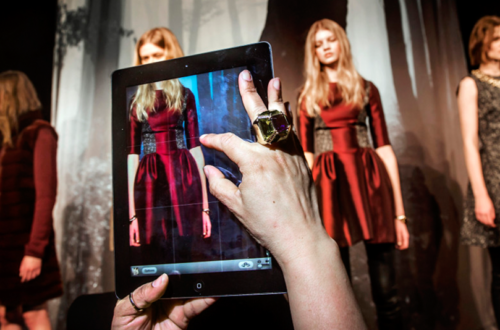On the 18th of September Bocconi Students for Fashion in collaboration with Jeme Bocconi Studenti organized the event named “Fashion Businesses and Disruptive Innovations”, which was held at Bocconi University.
Digitalization and online shopping are becoming elements that every fashion company should integrate in its business model in order to survive to today’s extreme level of competition. New technologies have changed the rules of the game, lowering barriers to entry and allowing new and disruptive business models to emerge. Thanks to an increasingly interconnected world, businesses no longer need high capital investments in order to grow both quickly and globally. As more and more ways of doing business emerge, those that do not adapt to the new scenario and to new customers’ needs will end up lagging behind. Moreover, it is important to note that consumers are more and more informed and they expect companies to provide them with a unique shopping experience that integrates offline shopping with the online one creating an omnichannel integration.

To have further insights on the topic, we have decided to invite two guests that would be able to effectively depict the situation from two different points of view. On the one hand, there was Roberta Benaglia, CEO of Style Capital, a private equity fund that has recently invested in RE/DONE. The other side of the market, that of consulting firms was represented by Laura Puricelli, director of digital transformation for Fashion & Luxury at PWC. The moderator of the event was professor Salvatore Testa, specialized in Fashion companies.
Roberta Benaglia’s, speech was focused on talking about the new investment Style Capital made on RE/DONE.
RE/DONE was born 4 years ago in California and its peculiarity is that it has introduced a new business model based on sustainability. The name itself sums up what the company actually engages in, as they take old and vintage pieces and re-new them. They started out with Levis’ Jeans and soon expanded into different vintage items.
The idea perfectly matches the concept of personalization and unique user experience since every piece is different from the others. This extra care is also a reason why the brand is a medium-high price one – a pair of jeans may cost more than $300.

The company has developed in the US since this country has a more open mindset for this kind of innovative online solutions with respect to Europe, moreover California is the heart of successful start-ups and being exposed to a dynamic environment is essential for the development of a successful start-up.
Even though, initially the company had started selling its unique pieces exclusively through the online channel, around a year ago, they decided to integrate the online experience also with the offline, by selling clothes in some selected wholesalers.
The aim of this strategy was especially that of expanding in the European market, which is still more-skeptical than the American one in online shopping. Just to give an idea of the numbers behind this business, the total revenues are $24M, of which 40% comes from online sales and the other 60% from the offline.
Furthermore, in order to support the digital channel, the company is constantly engaging in partnerships with brands, such as The Attico, collaborations and influencer marketing.

After Roberta Benaglia’s speech, Laura Puricelli talked about the daily challenges she faces at work. More specifically, her team is in charge of supporting companies with non-digital origins, that have to engage in digitalization in order to compete in the market.
To understand consumers’ expectations PwC has distributed a survey in 27 different countries and 21,480 interviews have been performed.
What has emerged from the survey is that 55% people are interested in products and the other 45% in services and experiences provided by companies.
However, contrarily to what people might think, although it is true that online shopping is exponentially growing, so is offline shopping. In fact, Millennials and Z generation are increasing their offline shopping by 50%.
A central role in pushing sales up has been played by Instagram, for advertisements of luxury products on Instagram can influence consumers up to 80%.
In addition to this, Laura Puricelli pointed out that companies need to build a consistent and coherent customer experience to be credible in all sales channels. We are already in the disruptive era and companies need to understand this and react to the change.
In the future, technology will allow sales assistants to recognize clients who enter into the shop and instantly know what was the last product they purchased or what preferences do they have. The objective is always that of proving a unique customer experience through the use of digital tools.

As we are reaching the end of this article, the main take away is that companies have to understand that the world of competition is changing and that there are innovations that can change the whole industry. Firms that do not renew will face difficulties in the long term. Understanding consumers and their current expectations should always be the first source of improvement.
by Beatrice Bolis





